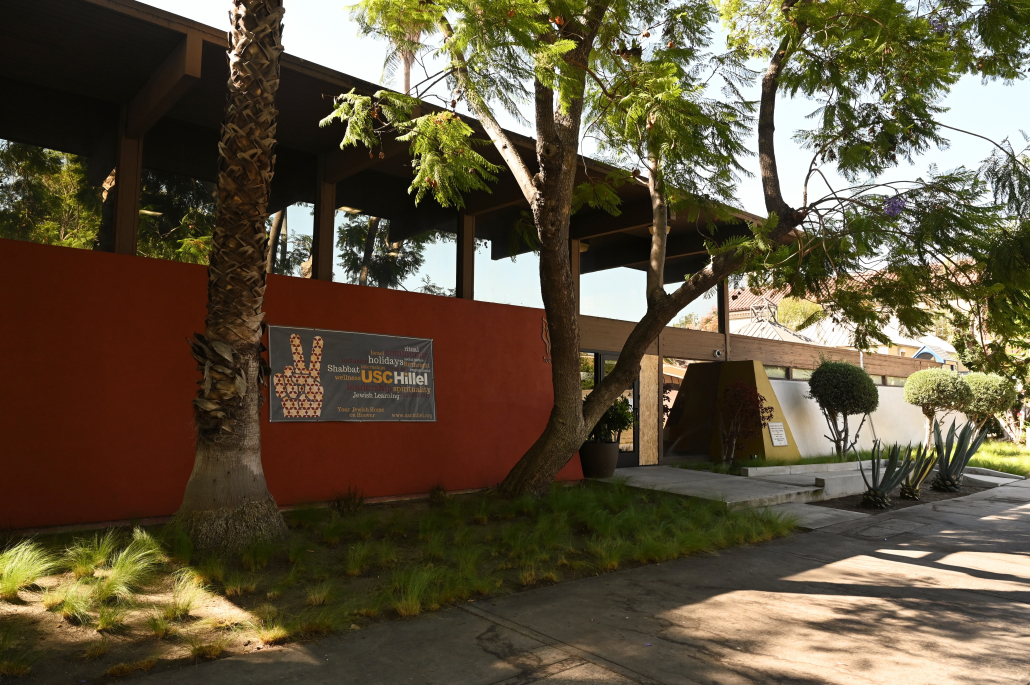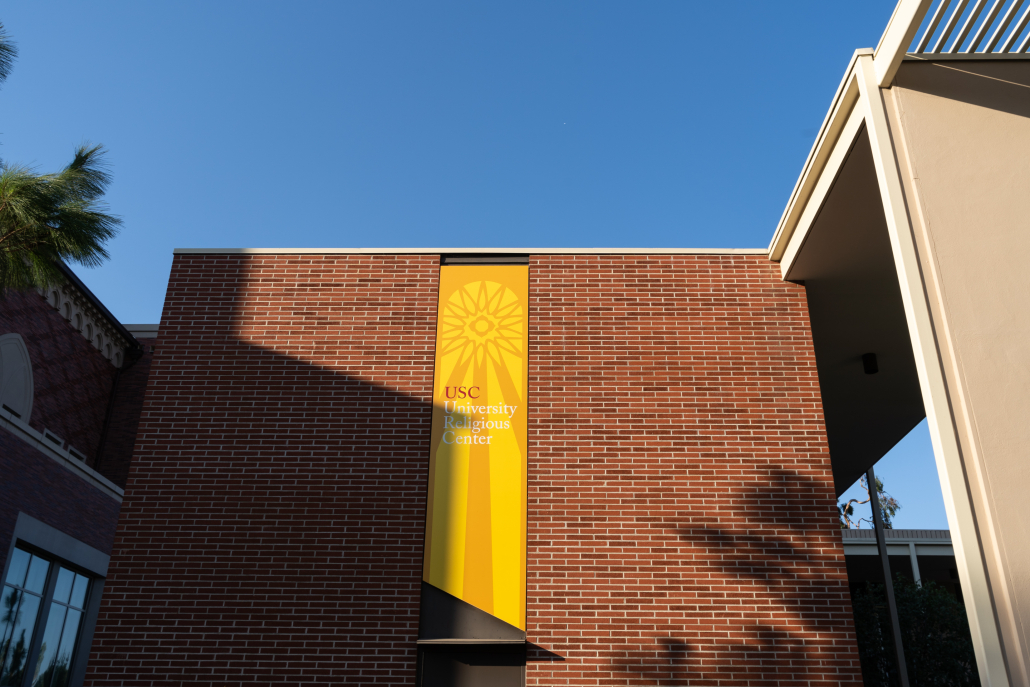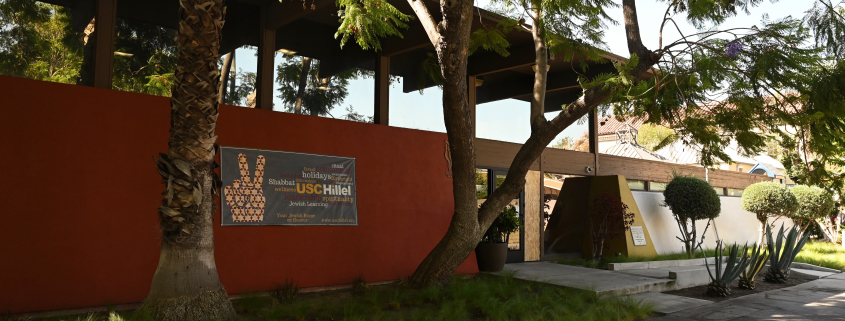Advisory Committee on Jewish Life at USC issues final report

More than seven months after its establishment, the Advisory Committee on Jewish Life at USC released its final report Aug. 23. Addressed to President Carol Folt, the report includes recommendations for combatting antisemitism on campus and otherwise ensuring an “equitable and inclusive” experience for members of the Jewish community.
“Over the last several years, there has been a dramatic rise of public antisemitism in the United States that has also impacted USC,” Dean of Religious Life and JLAC chair Varun Soni wrote, beginning the report. “We have witnessed antisemitic social media attacks against our students and others, and wrestled with how to best reconcile our commitment to expansive free speech with our responsibility to keep our community safe, secure, and free from threats and intimidation.”
The recommendations include clarifying official definitions of antisemitism and anti-Zionism, highlighting the work of Jewish organizations and individuals in official University communications, establishing kosher and halal food stations at dining halls, expanding training and educational programs to include Jewish perspectives and establishing the JLAC to serve in a standing capacity while it oversees the implementation of its recommendations.
“Please note that these recommendations do not constitute an exhaustive list but rather an important starting point,” the report read. “Many of these recommendations are underway or have already been implemented. Our goal is to audit these recommendations in one year from the date of this report’s submission to determine progress and assess additional needs.”
Folt accepted the report, writing in a University-wide letter Aug. 23 that her administration will continue to “work with this committee to implement its recommendations.”
Folt convened the committee in January following a months-long controversy surrounding tweets expressing antisemitic and anti-Zionist views that were posted last spring and summer — the aftermath of which included faculty open letters, death threats, FBI involvement and several University statements. In a community-wide email dated Jan. 13, Folt announced the University would be “taking specific new actions to systematically and operationally combat antisemitism on our campuses,” including the creation of the JLAC — with Soni as chair and 16 other members, two of them student leaders from USC Hillel and Chabad.
On the day the report was released, the USC Hillel building suffered property damage in what some social media users speculated to be an antisemitic act. In a statement Aug. 23 to USC’s Jewish community, Hillel executive director Dave Cohn wrote that “we do not yet know the motives or identities of any involved, and are not yet prepared to characterize the incident.” The Department of Public Safety said it is investigating the incident and, at the time of publication, had not released further details.
Far from being isolated incidents, antisemitism has continued an upward trend in the past few years, both at USC and at other universities across the country, Soni wrote in an emailed statement to the Daily Trojan.
“Antisemitism is both an ancient and contemporary form of hate, and one-third of Jewish students in the United States have personally experienced antisemitism,” Soni wrote. “In my role, I saw public antisemitism in higher education explode after neo-Nazis marched across the University of Virginia’s campus in 2017.”

The JLAC held five meetings over the course of seven months, interspersed with separate listening sessions hosted by Soni, during which students outside of the committee recounted their experiences with antisemitism.
The first meeting, Soni said, was for JLAC members to “collectively [decide] which issues to address.” By the time the report was finalized, these issues were identified under seven categories: defining antisemitism, defining anti-Zionism in relation to antisemitism, University communications, human resources and University policies, student life, research and education and DEI initiatives and training.
Subsequent meetings solicited a diverse array of perspectives to draft the 25 recommended solutions — not including the recommendation to establish a standing committee — listed in the report. Committee involvement ranged from USC Hillel and other student input — Soni said members “heard courageous and heartbreaking stories from Jewish students at USC” — to outside community organizations, including the Los Angeles branches of the Anti-Defamation League and American Jewish Committee. Professors of Jewish studies at colleges throughout the city were also included.
In an interview with the Daily Trojan, Cohn said such diverse membership “was an effort to try and bring in representative voices of Jewish community organizations that represent a wide breadth of community beyond campus.”
“Jewishness is very complex and very internally diverse,” Cohn said. “The idea of fully representing the entire Jewish community on any issue is often a challenging one. But I think that one of the qualities of the committee dialogue I felt best about was its openness to hearing all of us. And that was really part of what contributed to having such a comprehensive report.”
When asked about tangible changes to student life, Soni cited the report’s recommendations on clarifying definitions and student protections, as well as the addition of kosher and halal bars at dining halls in collaboration with USC Hospitality. Soni said these kinds of changes “will make our campus more welcoming and inclusive for Jewish students.”
Cohn noted that tangible impact was an “area of tension” in the committee.
“A lot of the grappling on the committee stemmed from figuring out where we have room to make an impact that students will feel,” Cohn said, “because we got a sense of all the different legal and procedural and code structures that already theoretically support students in difficult situations. And we were trying to balance that against people’s lived experiences and come up with solutions that are effective and act quickly.”
Cohn said there was still “more work to do” in that regard, but that the report “does a great job of illustrating those areas” that need further attention.
“I’m very grateful to the members of the committee for their deep discussions and thoughtful collaboration,” Soni said, “and I’m especially thankful to President Folt for convening us.”
Soni said he is looking to convene the Muslim Life Advisory Committee this year with Folt’s administration “and to ensure that we’re doing everything we can to support Muslim students on campus.”
USC Hillel President Zach Gordon, a senior majoring in economics/mathematics and psychology, said he appreciates the University’s response in “taking steps to make the Jewish family feel very safe.”
“USC is a premier destination for Jewish life on campus, worldwide. It was true before this, it’s going to be true after this,” Cohn said. “I fear we’ll never live in a world that’s free of hate; we’ll never live in a world that’s free of antisemitism. And so it’s our responsibility to institute the right policy framework for our contemporary time.”
Christina Chkarboul contributed to this report.

